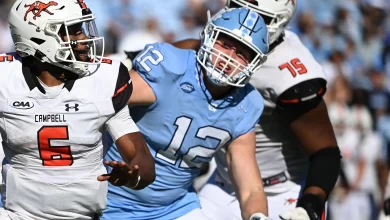LSU Alum Sam Burns Makes It Clear His Son Was NOT Named After Bear Bryant

In the world of sports, names often carry legacy, history, and meaning. When notable athletes or personalities name their children, fans and media alike sometimes speculate about the inspirations behind those names. Recently, LSU alum and professional golfer Sam Burns made headlines—not for his on-course achievements—but for setting the record straight about the name of his son. Burns firmly clarified that his son was not named after the legendary Alabama football coach Bear Bryant, dispelling rumors that had begun to circulate online.
This revelation has sparked conversations about the importance of names, legacy in sports, and how public figures navigate personal stories in the digital age. Here’s a deep dive into the story behind Sam Burns’ statement, the context surrounding the name, and what it means for fans and the athlete alike.
Who Is Sam Burns?
Before diving into the story of the name, it’s essential to understand the man behind it. Sam Burns is a rising star in the world of professional golf. Born in Shreveport, Louisiana, Burns played college golf at Louisiana State University (LSU), where he earned All-American honors and was a prominent figure on the team. Since turning pro, Burns has steadily built a reputation as one of golf’s promising young talents, claiming several PGA Tour victories and making a name for himself on the global stage.
Burns is also known for his deep ties to Louisiana and LSU, frequently expressing pride in his alma mater and community. His success on the golf course and his connection to Louisiana have made him a fan favorite, with many following his career closely.
The Origin of the Bear Bryant Naming Rumor
The rumor that Burns named his son after Bear Bryant, the iconic University of Alabama football coach, began circulating after Burns shared glimpses of his newborn on social media. The child’s name — which includes “Bear” — immediately caught the attention of sports fans, especially those familiar with the storied SEC football rivalry between LSU and Alabama.
Bear Bryant is a legendary figure in college football, credited with elevating Alabama football to national prominence and winning six national championships. His name carries weight, especially in the South, where college football rivalries are fierce and deeply ingrained in the culture.
Given the rivalry between LSU and Alabama, and Sam Burns’ LSU background, some fans and commentators speculated that naming his son “Bear” was a tribute—or at least a nod—to the Alabama coaching legend. For many, it was surprising and even confusing to think an LSU alum would name his child after a rival’s iconic figure.
Sam Burns’ Clarification
In response to the swirling rumors, Sam Burns took to social media and interviews to clarify the situation. He emphatically stated that his son’s name was not inspired by Bear Bryant.
Burns explained that the name “Bear” holds personal significance for him and his family, separate from any college football references. In fact, the name was chosen for its uniqueness and the personal meanings it carries, rather than any connection to the football coach.
By making this clarification, Burns hoped to put an end to the speculation and preserve the personal and familial nature of his son’s name. He expressed appreciation for fans’ interest but underscored that the name was a private matter, chosen with love and care.
Why Does This Matter?
At first glance, the debate over the origin of a child’s name might seem trivial, but it touches on several broader themes relevant to sports culture, media, and public life.
1. Legacy and Rivalry in Sports
College football rivalries, especially in the SEC, are legendary. Names like Bear Bryant evoke intense emotions, pride, and sometimes animosity. The idea of an LSU alum naming his son after an Alabama icon seemed incongruous to many fans, highlighting how deeply rivalry narratives can influence perceptions.
This story illustrates how sports rivalries extend beyond the field and into cultural interpretations of personal choices. Fans often project their allegiances and histories onto athletes, interpreting their actions through the lens of rivalry and legacy.
2. Privacy and Public Figures
As a public figure, Sam Burns’ personal life is subject to scrutiny. The interest in his son’s name reflects the broader challenge athletes and celebrities face in maintaining boundaries between their public and private lives.
Burns’ clear statement serves as a reminder that behind every athlete is a family with personal stories that may not fit neatly into public narratives. It highlights the need for respect and understanding of these boundaries.
3. The Power of Names
Names carry meaning, heritage, and identity. Choosing a name for a child is an intimate act, often reflecting family history, personal values, or hopes for the future.
In this case, the misunderstanding about the name “Bear” reveals how context shapes interpretation. While some immediately linked it to a football legend, for Burns, the name’s meaning is unique and deeply personal.
Public Reaction and Fan Responses
The news of Sam Burns’ clarification generated a range of reactions from fans, media, and fellow athletes.
Many expressed support for Burns and praised him for addressing the rumors directly. Social media saw a wave of messages emphasizing respect for personal choices and the importance of not jumping to conclusions.
Others took the opportunity to reflect on the cultural significance of names and sports rivalries, discussing how these factors influence fan perceptions and narratives.
Interestingly, some fans shared stories of their own children’s names, highlighting the diversity of inspirations behind naming decisions beyond sports.
The Broader Impact on LSU and SEC Culture
Sam Burns’ clarification also resonates within the LSU community and the larger SEC ecosystem. It underscores how intertwined sports culture is with regional identity and personal stories.
For LSU fans, the rumor initially caused some cognitive dissonance — the idea that one of their own might honor a rival figure through a child’s name felt unusual. However, Burns’ statement helped reaffirm the personal nature of such decisions, separate from sports allegiances.
In the broader SEC context, this story is a reminder that despite fierce rivalries, respect and understanding extend beyond competition. It highlights the human side of athletes, where family and personal values take precedence over sports narratives.
What’s Next for Sam Burns?
As Sam Burns continues his career on the PGA Tour, this episode regarding his son’s name serves as a footnote in an otherwise stellar journey. Burns remains focused on his game, his family, and his connections to Louisiana.
His candidness and willingness to engage with fans on this topic have only endeared him more to supporters. Moving forward, Burns will likely continue balancing the pressures of professional sports with the joys and responsibilities of fatherhood.
The story of Sam Burns and the naming of his son is a fascinating example of how sports culture, media narratives, and personal lives intersect in today’s public arena. By making it clear that his son was not named after Bear Bryant, Burns not only dispelled a persistent rumor but also reminded fans of the importance of respecting personal stories behind public figures.
In a world where every detail can be analyzed and speculated upon, Burns’ statement serves as a call for empathy and understanding. It highlights that behind every athlete is a family with their own unique traditions, values, and meanings—sometimes entirely separate from the games they play.
For fans of Sam Burns, LSU, and college football alike, this story is a gentle reminder that while sports inspire passion and loyalty, the human element should never be overlooked.









